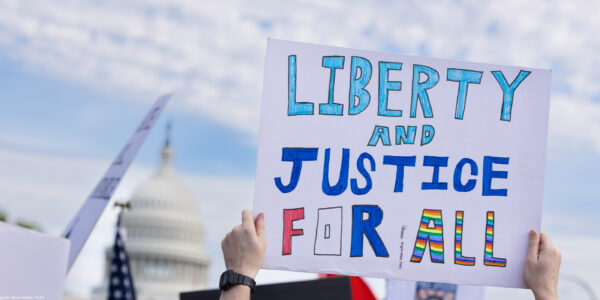By Daniel Linke, University Archivist and Curator of Public Policy Papers, Seeley G. Mudd Manuscript Library, Princeton University
Courtesy of the
The Mudd Library is pleased to announce that the final two series of the (ļž–” ”∆Ķ) records have been processed, and that the entire col¬≠lec¬≠tion has been addressed is now avail¬≠able to the pub¬≠lic. These mate¬≠ri¬≠als join ļž–” ”∆Ķ records long held at the Mudd Library: and . As a whole, this col¬≠lec¬≠tion doc¬≠u¬≠ments the civil lib¬≠er¬≠ties organization‚Äôs work in areas includ¬≠ing civil rights, chil¬≠dren and women‚Äôs rights, free¬≠dom of speech (and all First Amend¬≠ment ques¬≠tions), due process, the right to pri¬≠vacy, and church-state sep¬≠a¬≠ra¬≠tion issues, and this third sub¬≠group cov¬≠ers the years between 1975 and 2000 pre¬≠dom¬≠i¬≠nantly. The records are of vital his¬≠tor¬≠i¬≠cal and cul¬≠tural impor¬≠tance to the nation, and we are grate¬≠ful that the work on these records was .
Founded in 1920, the ļž–” ”∆Ķ‚Äôs mis¬≠sion is ‚Äúto defend and pre¬≠serve the indi¬≠vid¬≠ual rights and lib¬≠er¬≠ties guar¬≠an¬≠teed to every per¬≠son in this coun¬≠try by the Con¬≠sti¬≠tu¬≠tion and laws of the United States.‚ÄĚ The group has been inte¬≠gral in myr¬≠iad land¬≠mark court cases since its incep¬≠tion, and the col¬≠lec¬≠tion of new mate¬≠ri¬≠als housed at Mudd con¬≠sists, notably, of records from the Repro¬≠duc¬≠tive Free¬≠dom Project, the Women‚Äôs Rights Project, the Robert Bork Supreme Court nom¬≠i¬≠na¬≠tion hear¬≠ings, the Iran-Contra affair, and Texas v. John¬≠son (the 1990 flag-burning case). The newly avail¬≠able records also include over 300 boxes from the ļž–” ”∆Ķ‚Äôs , which han¬≠dled many impor¬≠tant civil rights cases
Adri¬≠ane Han¬≠son, who man¬≠aged the pro¬≠cess¬≠ing of the new ļž–” ”∆Ķ mate¬≠ri¬≠als, began in June 2010, and with the help of sev¬≠eral Prince¬≠ton stu¬≠dents, she inven¬≠to¬≠ried and processed 2,500 lin¬≠ear, in Mudd Library‚Äôs his¬≠tory. Mudd Library‚Äôs entire ļž–” ”∆Ķ col¬≠lec¬≠tion, which is its largest and most used, now spans about 4,200 lin¬≠ear feet.
For more infor­ma­tion, read the Prince­ton Alumni Weekly’s
Learn more about your rights: Sign up for breaking news alerts, , and .



